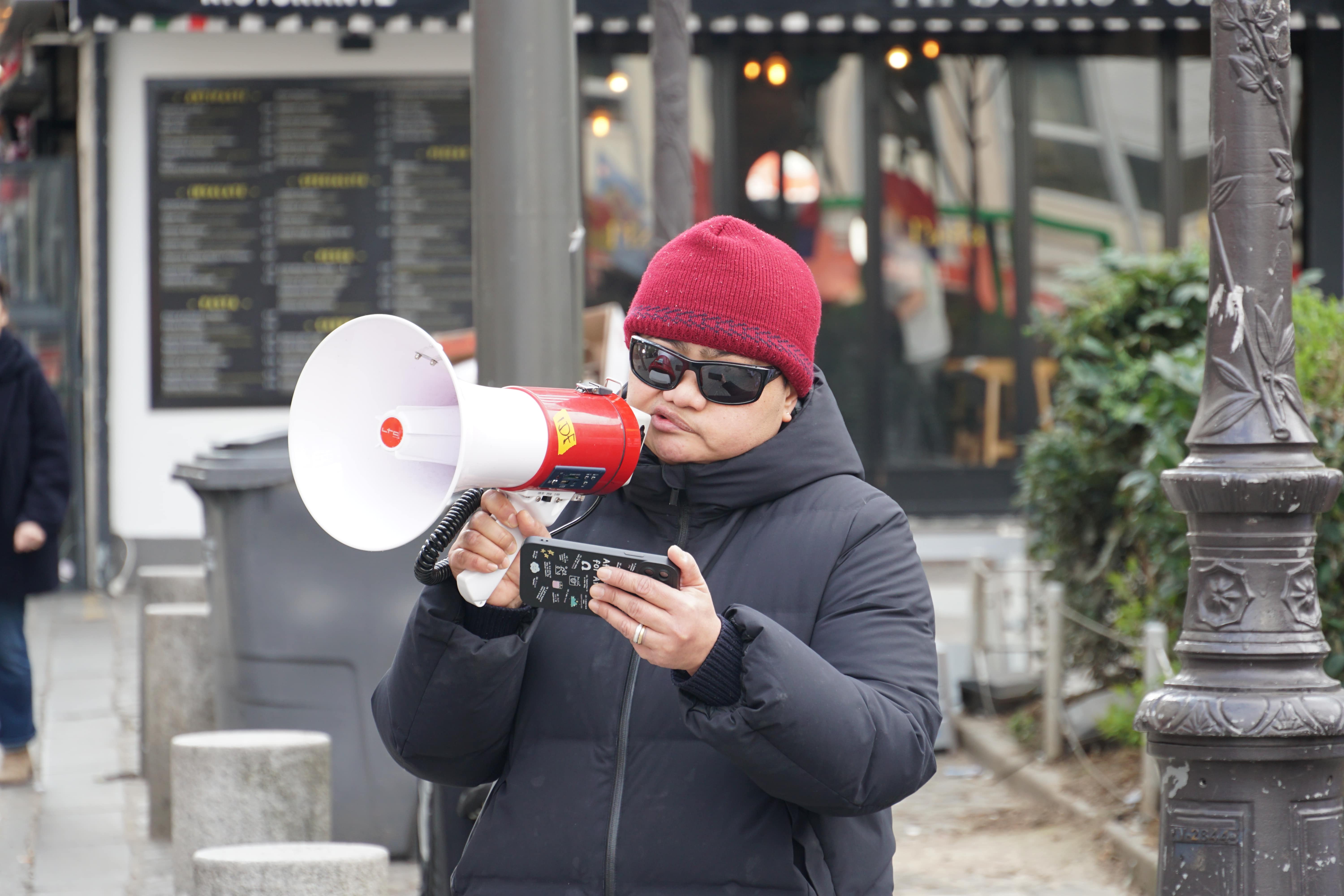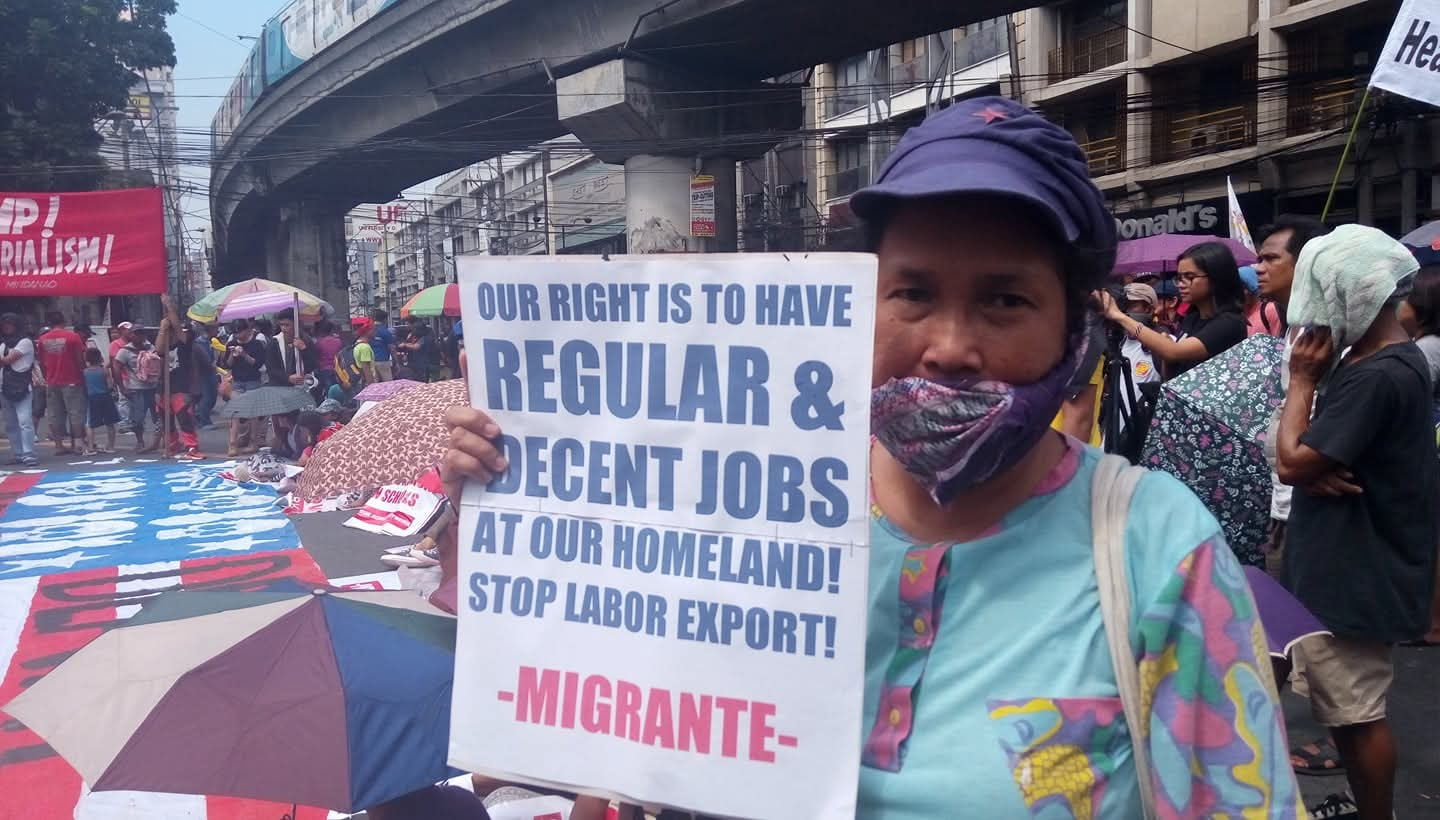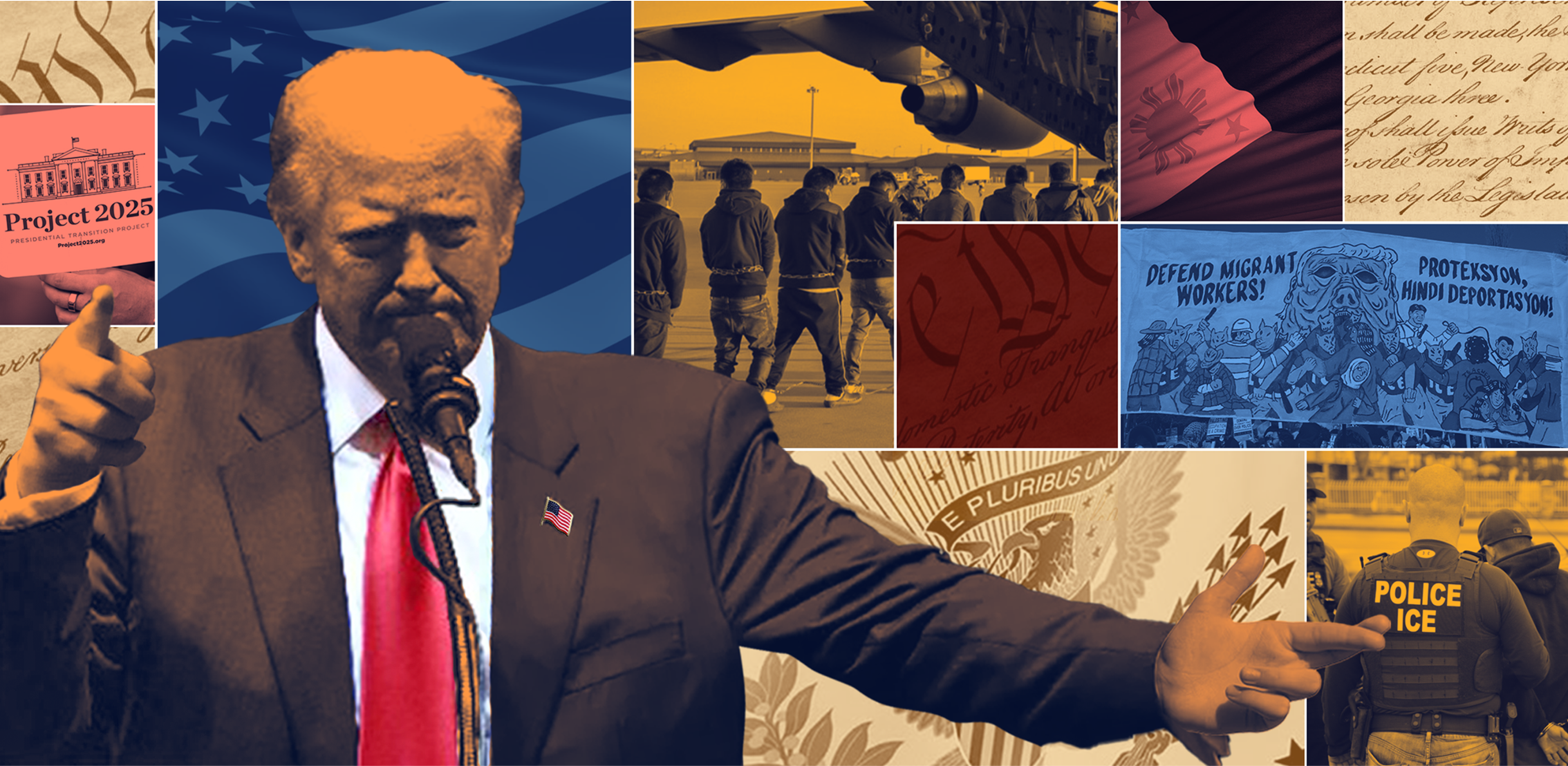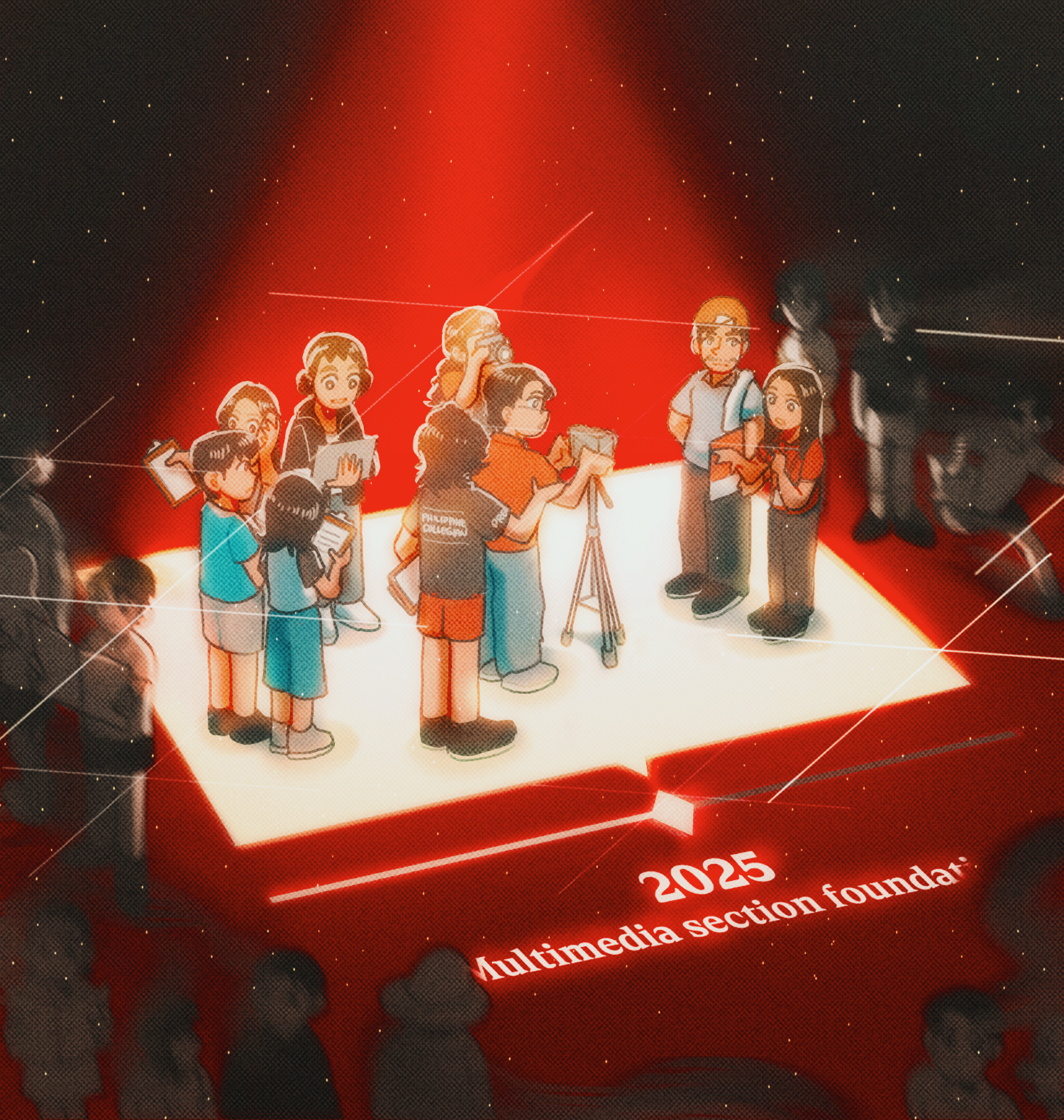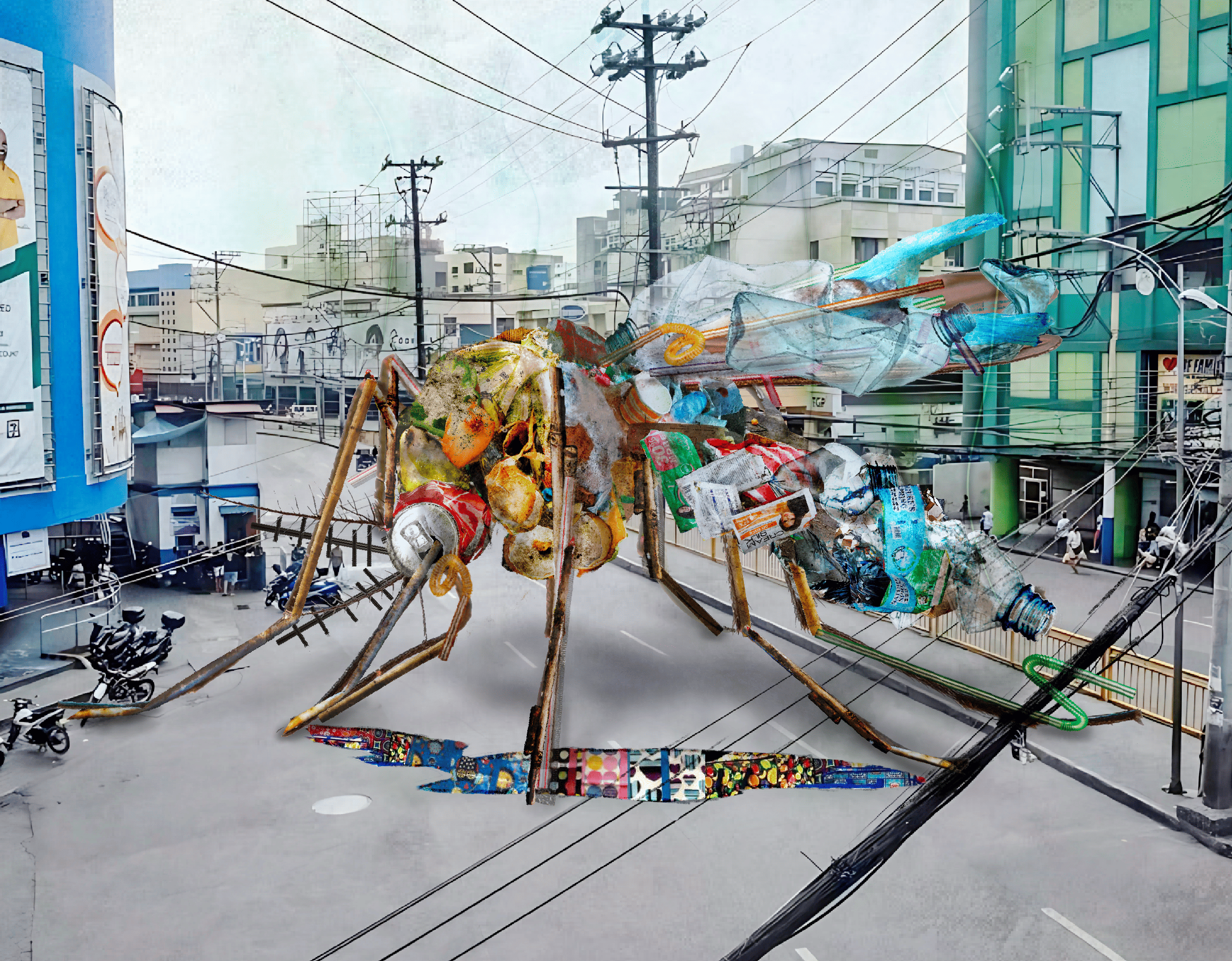Over a bowl of Pancit Molo, Irish Inoceto, 48, recounted the two circumstances that led her to Paris, France. She was in a long-distance relationship with Filipina migrant worker and activist Dhaizie Bongay, who is now her wife. She was also targeted by former President Rodrigo Duterte’s red-tagging campaign that rendered her life unsafe as an LGBTQ+ activist in the Philippines.
To escape the same danger that befell killed activists, Irish sought political asylum in France in 2023. Far from the land she once fought for, she carries the queer Filipino struggle into new soil. A year into her stay in Paris, she and Dhaizie co-founded Bahaghari France, an international chapter of the national democratic LGBTQ+ organization Bahaghari.
Irish’s story is proof that the hope for queer and Filipino liberation cannot be easily extinguished by the state and all its violent machinations. That hope endures—as a luggage she carries across borders, heavy with memories of love and resistance.
Marches and Migration
Irish’s journey from Iloilo to Paris mirrors the cost of speaking out in Duterte’s Philippines, where being a queer grassroots organizer meant becoming a target of state attacks.
Irish’s activism during her youth was not welcomed by her father, a police officer, and her mother, a government worker. “We are on opposite sides of the spectrum. Mas out pa nga ako bilang lesbiyana kesa bilang aktibista,” she said.
She traced the roots of her militancy back to her days at UP Visayas Miag-ao, where she was a member of the environmental organization UPV Oikos Ecological Movement. She also served as the secretary-general of their local chapter of League of Filipino Students, realizing that protecting nature entails fighting the profit-driven system behind its degradation.
From blocking roads to demand the resignation of former President Joseph Estrada in the early 2000s, Irish would go on to organize local Pride marches attended by thousands of Ilonggos. She served as chairperson of the Iloilo Pride Team and secretary-general of Gabriela Panay from 2020 to 2022. But her advocacies for gender justice and government accountability drew the ire of the state.
With the creation of the National Task Force to End Local Communist Armed Conflict (NTF-ELCAC) in 2018 and the imposition of a “state of lawlessness” in 2019 in Visayas, Irish became increasingly red-tagged, especially during the pandemic. Her face, name, and affiliations were doxxed and tied to the armed rebellion in online posts, tarpaulins, and SMNI broadcasts.
“May mga attacks din sa mga kasama, kahit lawyers. So nakakatakot kasi anytime pwede kang dukutin, patayin, arestuhin,” Irish said.
Throughout Duterte’s term, rights organization Karapatan tallied 54 political extrajudicial killings, one enforced disappearance, and 85 political prisoners in Western Visayas.
Such a climate of fear and repression pushed Irish to adopt taxing safety measures. Instead of public transportation, she opted for taxis and odd routes home. She was hypervigilant of shadows and noises outside their house, prompting her to seek refuge at friends’ places or hotel rooms. To be less recognizable in public, she shaved her hair to a buzz cut.
With no place left to call safe, Irish left for France in 2022 to seek asylum. There, she finally met in person Dhaizie, a trained nurse in the Philippines who had chosen to work as a nanny in Paris for better pay. They met through Facebook, fell in love, and entered into a committed relationship during the chaos of the pandemic and the attacks.
Dhaizie, in front of a crowd of Filipino migrants and international allies, recalled the OFWs victimized by Duterte’s drug war. (AJ Dela Cruz/Philippine Collegian)
Struggle in Exile
After a month in Paris, Irish began her asylum application. During the interview stage, she told the panel to simply look up her name, which led them to a barrage of red-tagging content that left them stunned. By December 2023, her application was granted.
It took some time for Irish to finally revel in the relief of being away from danger. But she does not stay totally complacent, citing NTF-ELCAC’s International Engagement Cluster. The cluster coordinates with organizations like the European Union and OFW communities to address the so-called International Solidarity Works associated with groups it deems “communist terrorists.” In 2019, the agency collaborated with OFW group BISDAK UK, a Visayan organization in the United Kingdom, for an “information dissemination session.”
A saving grace of exile, for Irish, is the LGBTQ+ rights she now enjoys—freedoms denied to queer Filipinos back home. In France, she and Dhaizie were able to marry and have their family legally recognized. They are also protected by France’s anti-discrimination laws on gender.
Irish with other members of Bahaghari France. (AJ Dela Cruz/Philippine Collegian)
But her experience has been far from smooth sailing amid the crucial changes that hounded her, from adjusting to the chilly foreign climate to embracing her new job as a care worker.
“Tinuruan niya (Dhaizie) ako paano maglinis ng kusina, paano magbantay ng bata,” Irish said. “Mas nalaman namin paano hatiin yung tasks o paano mag-work as a team.”
Despite the physical toll, long hours, low pay, and feelings of insecurity and disposability, Irish persists—not only for the survival of her family, but also to help sustain Bahaghari France.
Imminent Return
Amid care work and exile, Irish and her wife still carve out space for activism while holding on to the hope of one day returning to a free Philippines.
Weekends and free time turn from rest to protests, meetings with members of the organization, and outreach events to recruit more members for their campaigns. But tight schedules due to the norm of having multiple contractual gigs deter Filipino migrants from joining their organization, said Irish.
Bahaghari France’s ranks may not be thick with Filipinos now, but Irish takes pride in their ability to reach allies of various nationalities and forge ties with international organizations. They exchange lessons from global liberation movements while amplifying the Filipino struggle. So when news of Duterte’s arrest broke, it was not just Bahaghari France that rejoiced in Paris, but a chorus of progressive international allies as well.
When asked about how she feels about the former president’s arrest, Irish didn’t hesitate: “Dasurv na dasurv.” Beyond a conviction, she hopes victims like her of Duterte will receive reparations for the violence they suffered. Still, even with Duterte behind bars in foreign land, Irish does not feel safe enough to return home. Under President Ferdinand Marcos Jr., the machinery of repression remains—NTF-ELCAC continues to operate, extrajudicial killings persist, and the bloody legacy of Duterte lives on.
Progressive Filipino and international organizations in Paris called out for Duterte’s prompt conviction. (AJ Dela Cruz/Philippine Collegian)
Yet Irish is hopeful that she—and every Filipino forced to leave their homes due to fear or poverty—will one day come home to a genuinely free country. In that future, she dreams of safety for activists and queer individuals, sharing a bowl of Pancit Molo with the communities she once served, no longer in hiding, but gathered in celebration. ●
First published in the May 27, 2025 print edition of the Collegian
